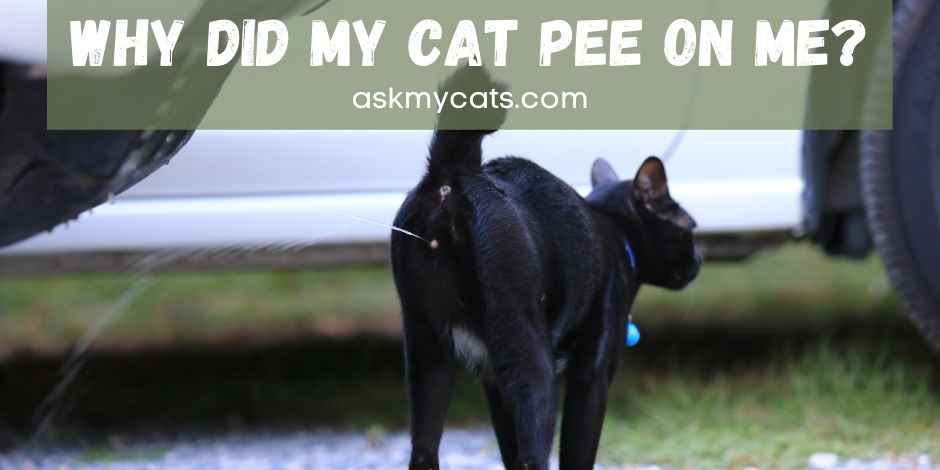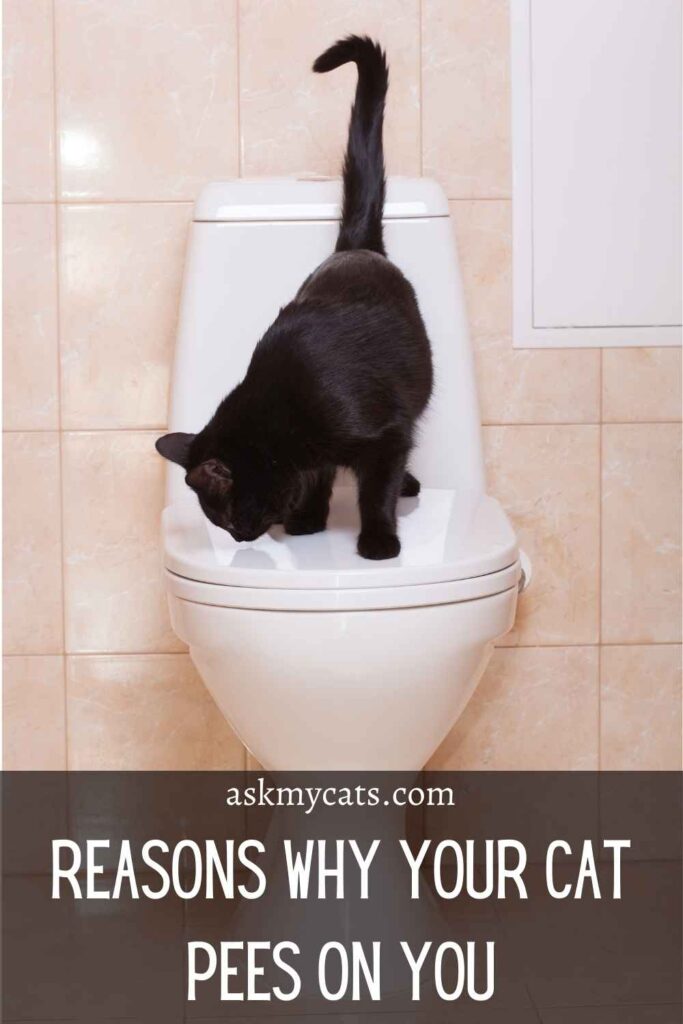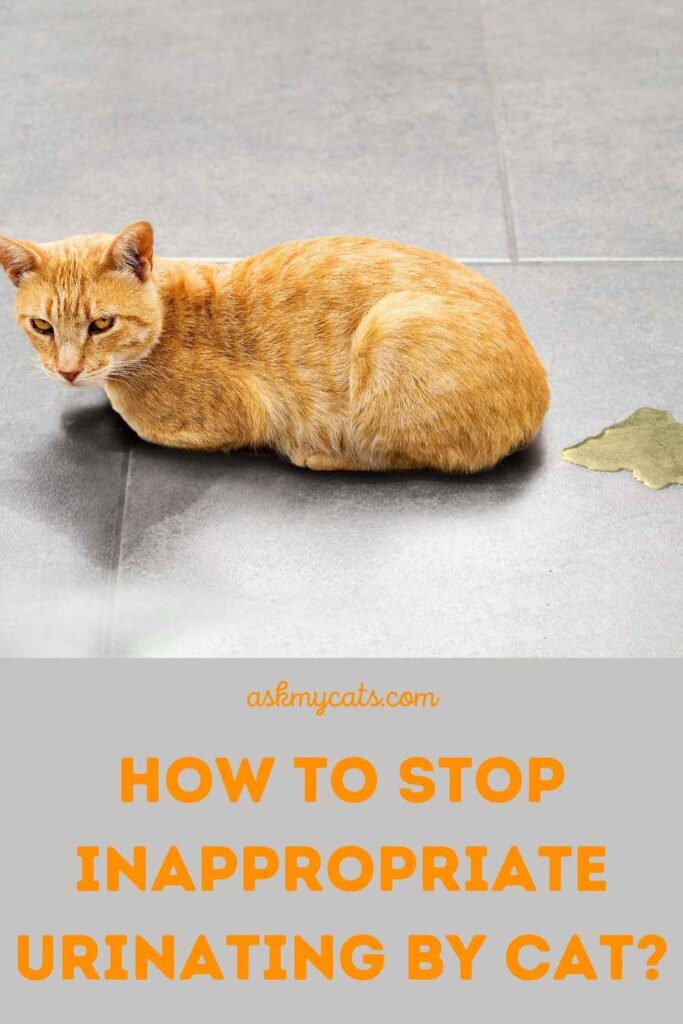When your cat peed on you, there’s no easy way to find out why. There are a number of possible theories for this seemingly simple behavior, and narrowing them down to only one may be difficult.
However, when a cat pees on a person, it indicates that something is wrong, and while you might not be able to pin down the cause, there is a lot you can do in terms of being vigilant to help you solve the problem, regardless of what it is, which may be particularly useful if peeing on humans seems to be a chronic problem.
When a cat pees on you, it is a warning that there’s an issue that needs to be solved right away. If your cat is in charge of this behavior, it is almost definitely behaving in this manner as a call for assistance, resulting from extreme distress and stress.


Give Your Cat the Perfect Day
Get the Free Ebook!
Reasons Why Your Cat Pees On You

1. UTIS
UTIs are common in cats, especially in male cats that do not drink enough water on a daily basis.
Given how popular they are and how likely they are to be the cause of this situation, it’s vital that you take your cat to the veterinarian and tell him or her about your cat’s conduct.
Other signs that your pet is suffering from a urinary tract infection include:
- When trying to pee, I went to the bathroom and began moaning as if in pain.
- Peeing in unusual locations, such as tile tiles, bathrooms, or covers.
- Attempting to use the litter box much more often than normal.
- Using the toilet and then going without urinating.
There are special diets that cats with frequent UTIs are often prescribed, so please inquire about them as well as any preventative steps your veterinarian can recommend if your cat suffers from them frequently.
2. Messy Litterbox
Cats also do something that resembles “punishing” their pet owners by urinating in odd locations, but this isn’t about retribution at all.
It’s about letting you know there’s something wrong in their surroundings, and the first and most noticeable way this can happen is in the litter box if there’s a cat that peed somewhere he or she shouldn’t.
When the litter box smells or is filthy, cats choose not to use it.
Many people would go to great lengths to stop using it until it’s clean, but if they wait too long, they can end up getting an accident on a human’s lap or while lying in bed with a human.
You might also like to read Cat Peeing In The Sink: What To Do?
3. Fear Of Bossy Cats
Think of going to the washroom and seeing someone waiting for you, or maybe coming in and scaring you out because they believe it is their washroom and you shouldn’t be using it.
While this can seem ridiculous in humans, it’s fairly typical for cats to chase other cats out of what they perceive to be their territorial place to “go” – and indeed, a cat may believe that any single litter box in the house is his or her territory to be covered.
A nervous cat, too scared to use the litter box, can try to hold back his or her urine until he or she can no longer hold it in – this may happen to be right around the moment your fuzzy tries to climb into your lap for a cuddle.
Also, check out do cats pee when scared
The floodgates metaphorically burst, and you’re drenched, just as he or she starts to relax and avoid feeling nervous (in your presence). You, as well as the kitty, are unfortunate.
4. Didn’t Like The Litter At All
Cats are known for being picky with the litter they use in the litter box.
If they can’t bear it for any reason, they may put off using the litter box, only to unintentionally go right when they’re snuggling on your lap because they couldn’t take it any longer.
This may be the case if you’ve just switched litters. Return to the previous setting.
If you’re not sure which litters to try but believe this is the issue, bear in mind that unscented litters are much more common than scented litters.
Finding the right litter box can be complicated due to the fact that cats have varying tastes.
Some cats like litter boxes that are sealed. Some cats like litter pans that are not sealed (if it turns out your cat is like this but also gets litter outside the box, there are open-top litter boxes with shields).
Some cats, particularly those in multi-cat households where litter boxes are shared, do extremely poorly unless their litter boxes are extremely large. These litter boxes are suitable for households with many cats.
Experiment with alternative litter boxes if you’ve recently moved litter boxes or if you think your cat would enjoy a different style of box. You might find that the right fit solves the dilemma.
our Recommendation
Looking for a natural and eco-friendly cat litter option? Say goodbye to smelly and dusty litter and hello to a healthier and more sustainable option for you and your furry friend.
Find out our recommended cat litter pellets which are Easiest to clean, Blocks Odour, and are Best for your Cats.
5. Lost Control Of Bladder
Some cats actually lose bladder control and, as a result, will be lying on your lap, have a nice time, and then pee on you by mistake.
When your pet is overweight, he or she is more likely to have incontinence. Cats in their middle to late years are much more likely to lose bladder function.
If you think your cat’s urination on you is due to a lack of bladder control, please see your doctor.
There are a number of drugs that your veterinarian should try, and all of them are effective at treating cats with incontinence problems.
Inflammation is the most common source of incontinence, and can usually be treated by the veterinarian with antibiotics and topical ointments.
Also, check out Why Does My Pregnant Cat Pee Everywhere?
6. Mark Their Territory
Male cats that have not been neutered are more likely to mark their territories with urine marks, though this only occurs when they feel disturbed by other cats, such as those they share their home with.
By rubbing their faces and bodies against surfaces such as tables, beds, door frames, and cat trees, most cats can smell without using urine.
This method of scenting is usually sufficient to make them feel protected and protected since they are surrounded by their own scent.
However, an agitated, depressed cat who feels disturbed by other cats, such as one or more felines in their home, may begin to urine mark as a sign of excessive stress and anxiety toward the cat.
Your cat is most likely considering you to be their turf, so if one or two of them label you with pee, it’s a sign of a bigger problem.
This may be the case if your cat has been peeing on you and has been marking with urine in various parts of your house. That could also be the case if your cat has a tense relationship with one or more of your pets.
If this is the case, neutering or spaying the cat in question, as well as reintroducing the animals can go a long way toward resolving the violence and fear.
7. Highly Frightened Moment
If your pet was in a particularly traumatic situation, such as watching a carrier emerge just before being taken to the vet, it’s most likely that your cat peeing on you was motivated by anxiety rather than something else.
You will certainly support cats that are overwhelmed by the two common triggers: fear of carriers/getting into carriers and fear of vehicles/being in cars.
Also, check out the solutions for cat pee smell in car
Do Cat Urine Raises Health Threats?
If you still have a respiratory infection, inhaling cat urine will make it worse! The elevated levels of ammonia present in cat urine may be the cause of your respiratory issues.
This may also be very risky for patients who have bronchitis or asthma. Your feline companions could be putting you at risk if you have swollen eyes, itchy ears, or a runny nose.
How to Stop Inappropriate Urinating By Cat?

Cats hate the litter box, which is one of the most important reasons they urinate outside of it. If your cat is peeing all over the place and you’ve ruled out medical causes, it’s time to rethink your litter box setup.
To begin, make sure your cat’s litter box is as clean and appealing as possible. Choose the biggest litter boxes you can and leave them uncovered as far as possible.
Your pet, particularly if it’s a big or fluffy cat, can feel crowded inside a covered cage.
Place litter boxes in a home that is both peaceful and open. Be sure they aren’t in your cat’s eating or drinking field.
Try using a decorative screen to divide the cat litter box area from other areas for your cat’s protection and your own decor.
Your senior cat should be able to get into the litter box with ease. Consider purchasing a shallow cat box or installing a ramp at the box’s entrance.
You might also like to know the reasons behind why old cat peeing everywhere
Make sure your cat is comfortable in your house. To make your cat’s atmosphere perfect, add lots of vertical space and feline enrichment. Remember to engage your cat in playtime and have treats.
If environmental improvements are ineffective, your veterinarian can suggest a supplement or prescription drug to help your cat cope with stress and anxiety.
OUR Recommendation
If you’re dealing with the frustrating issue of cat spraying, our recommended product can help. Check out this simple solution which will eradicate your cat’s urination problem once and for all.
Frequently Asked Questions
Why would a cat urinate on a person?
Uncastrated cats urinate to mark their territories. Changes in the household are the most prevalent cause of feline stress behaviors, which often result in cats urinating on humans and objects. When the furniture in the house is rearranged or repairs are taking place, cats may become agitated.
Why is my cat suddenly peeing on me?
If the cat is next to you, there’s a possibility he or she thought someone or another animal was attempting to claim you. In the worst-case scenario, there may be a medical cause, such as a bladder disorder, a neurological illness, or an accident. Or you may have done anything to irritate the cat.
Do cats pee to get attention?
When cats are sick, they often urinate in odd ways to get the attention of their owners. Furthermore, cats often urinate in odd ways in an attempt to reassert their claim to territory, a need that is often triggered by social tension and can quickly lead to illness.
Do cats pee on you when they are mad?
When your cat urinates on your things, you may think he’s being spiteful, but the fact is that he’s actually stressed. It’s not rare for me to hear from clients who complain their cats are furious, frustrated, or just plain spiteful, and that they’re acting out by urinating on their possessions or furnishings.
Final Words
If cats are attempting to interact with you personally, they can urinate/defecate in unusual ways. When they are sick, this is the only way they can communicate with you. It will get your attention, and they are well aware of this.
They’ll let you know if their litterbox needs to be swept. If someone/something foreign has entered their/your territories, this may be a means of letting the newcomer know that they have been heard and that they are marking territory.
Your cat may be mad over something you’re not sure of because it’s trying to warn you something’s wrong.
Have you ever seen your cat pee on you? Have you figured out why?
Are there any other plausible reasons for cats peeing on humans that I haven’t considered? Which of the above do you conclude are the most plausible reasons for this behavior?
I’d love to hear your suggestions, theories, anecdotes, and memories in the comments section below!
Interesting Read: Why Is My Cat Not Urinating After Being Spayed?

My 2 cats (3 yrs and 10 mths) will wake me up in the morning to feed them wet food. They always have dry. The older one will tap me on the face until I get up. If I shoo her away and don’t get up the younger one will pee on me. I think it’s because I always jump up when she does it. How do I stop it is my dilemma.
Instead of challenging your cat to eat dry food instead of wet food, give them what they want. They probably pee on you to show their disfavor.
The stray cat (Fluffy) I brought with me to my new house was peeing on me because I had to keep her inside for 6 weeks. She also had worms that were treated. I thought we’d turned a corner as I was finally able to let her outside to explore again but she hesitates at the door to come back in. After sitting on cold tiles with a back door open to freezing weather at 2.30am I gave up at 3am but came back down at 5am calling for her from the window in-between times. Finally she ran inside around 6.30am because the bin truck scared her. But she was definitely vocal and unhappy she was out all night in the cold. When we got upstairs she let me pet her on the bed then picked a spot to pee but I pushed her gently off and picked her up and placed her in the kitty litter. She was even ignoring her treats. Eventually I went over to the cat tree and gave her a scratch telling her I was sorry lol so she purred a little then jumped on the bed to let me pet her but soon
got up and picked a spot to pee yet again and again I pushed her gently to stop but she peed on the clean duvet set I was about to put on the bed of all things! Luckily I had invested in a waterproof fitted sheet and throw for the bed. But I’d really like her to lose this habit. Was she peed off with me or marking her territory as her and my adopted cat Millie are not friends unfortunately.
That is one of a kind story!
Start by providing her with more litter boxes and some training.
Make sure the location of the boxes are reachable by your cat. Consult the vet for better advice on this situation. You cat may have an undiagnosed infection.
I have 12 inside kitties. Just kind of happened because we rescued so many. Not taking in anymore as it’s too many. For the most part, they get along other than the occasional fight. My three male cats started marking their territory but I have solved one of them doing this by letting him have his own room. He comes out now and then, but he’s quite happy being by himself or with his sister. Both of the other two males will mark spots and I just have to keep cleaning. Today, I was sitting on my bed watching tv and one of the male cats came up (no other cats were on the bed) and he peed right on me! I was so aggravated at him! He’s never done this before. What would cause him to do this now?
Cats often mark their territory by spraying urine on objects and surfaces in their environment. This behavior is more common in male cats, but it can also occur in females, particularly if they are not spayed. In your case, it is likely that your cat is marking his territory because he feels threatened or anxious in some way. This could be due to a number of factors, such as the presence of other cats in your home, changes in their routine or environment, or even changes in your own behavior or mood.
To help prevent your cat from marking his territory in this way, it is important to address any underlying causes of his anxiety or stress. This might include providing him with a separate space where he can retreat if he feels overwhelmed, or making sure that he has plenty of opportunities to engage in activities that he enjoys, such as playing with toys or scratching posts. It can also be helpful to provide your cat with plenty of hiding places, such as cardboard boxes or pet tents, where he can go if he feels scared or anxious.
Additionally, it is a good idea to clean any areas where your cat has previously sprayed urine, as the lingering scent can trigger him to mark the same spot again. You can use a commercial enzymatic cleaner to remove the urine odor, or you can make your own cleaning solution by mixing one part white vinegar with three parts water. Be sure to blot up as much of the urine as possible before cleaning, and avoid using any cleaning products that contain ammonia, as this can mimic the scent of urine and trigger your cat to mark the spot again.
Overall, it is important to be patient and understanding with your cat, and to provide him with the support and care that he needs to feel comfortable and secure in your home. With time and patience, you can help to prevent your cat from marking his territory in this way.